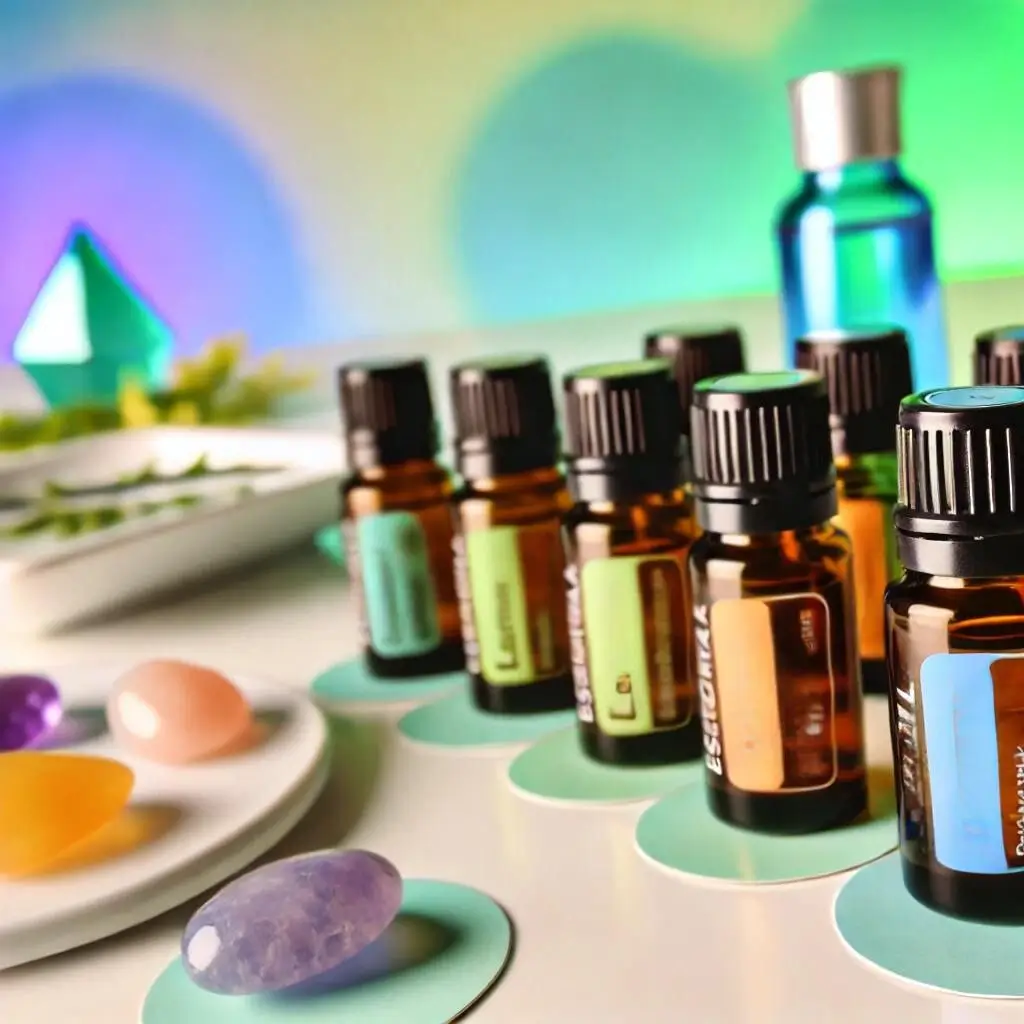Obsessive-Compulsive Disorder (OCD) is a chronic condition characterized by unwanted and intrusive thoughts (obsessions) and repetitive behaviors (compulsions). Managing OCD often involves a combination of therapy, medication, and lifestyle changes. Essential oils, known for their therapeutic properties, are increasingly being explored as a complementary approach to help alleviate symptoms of OCD. This article will delve into the potential benefits, usage, and safety considerations of using essential oils for OCD.
Can essential oils help manage OCD symptoms?
Essential oils are plant extracts known for their aromatic and therapeutic properties. They have been used for centuries to promote mental and physical well-being. In the context of OCD, essential oils may help manage symptoms by reducing anxiety, promoting relaxation, and improving sleep, which can indirectly alleviate obsessive and compulsive behaviors. Here’s a closer look at how essential oils can help with OCD:
Reducing Anxiety
Many essential oils have anxiolytic properties. Lavender oil, for instance, is well-known for its calming effects. Research suggests that inhaling lavender oil can significantly reduce anxiety levels, which is crucial for individuals with OCD.
Promoting Relaxation
Essential oils like chamomile and frankincense are known to promote relaxation. Regular use of these oils can help create a sense of calm, reducing the urge to engage in compulsive behaviors.
Improving Sleep
OCD often disrupts sleep patterns. Essential oils such as valerian and lavender are effective in promoting better sleep, which can improve overall mental health and reduce OCD symptoms.
Supporting Emotional Balance
Oils like bergamot and rose are used to balance emotions. This can help individuals with OCD manage their moods better, reducing the intensity and frequency of obsessive thoughts.
| Essential Oil | Primary Benefit | How to Use |
|---|---|---|
| Lavender | Reduces anxiety | Inhalation, diffusion |
| Chamomile | Promotes relaxation | Inhalation, topical application |
| Frankincense | Reduces stress | Diffusion, topical application |
| Valerian | Improves sleep | Diffusion, topical application |
| Bergamot | Balances emotions | Inhalation, diffusion |

Which essential oils are best for OCD?
Selecting the right essential oils is crucial for effectively managing OCD symptoms. Here are some of the best essential oils known for their benefits in this context:
Lavender
Lavender is one of the most versatile essential oils. It is well-known for its ability to reduce anxiety and promote relaxation, making it an excellent choice for those with OCD.
Chamomile
Chamomile oil is renowned for its calming properties. It helps soothe the mind and body, reducing stress and promoting a sense of peace.
Frankincense
Frankincense has grounding properties that help reduce feelings of stress and anxiety. It promotes mental clarity and emotional stability.
Valerian
Valerian oil is primarily used to improve sleep quality. It can help individuals with OCD get better rest, which is essential for managing symptoms effectively.
Bergamot
Bergamot oil is uplifting and calming. It is particularly effective in balancing emotions and reducing feelings of anxiety and stress.
Rose
Rose oil is known for its soothing properties. It helps in reducing stress and promoting emotional well-being.
How to use essential oils for Essential Oils for Obsessive Compulsive Disorder?
Using essential oils correctly is key to maximizing their benefits for managing OCD. Here are some effective methods:
Inhalation
Inhalation is one of the most effective ways to use essential oils. You can inhale the aroma directly from the bottle or use a diffuser to disperse the scent throughout the room.
- Direct Inhalation: Simply inhale the aroma directly from the bottle for quick relief.
- Diffusion: Use an essential oil diffuser to spread the aroma in your living space. This method provides continuous exposure to the calming scents.
Topical Application
Topical application allows essential oils to be absorbed through the skin. Always dilute essential oils with a carrier oil before applying to avoid skin irritation.
- Dilution: Mix a few drops of essential oil with a carrier oil like coconut or jojoba oil.
- Application: Apply the diluted mixture to pulse points such as wrists, temples, and the back of the neck.
Bathing
Adding essential oils to a bath can provide a relaxing and therapeutic experience.
- Bath Blend: Add a few drops of essential oil to your bathwater along with a carrier oil or bath salts.
- Soak: Enjoy a long soak to let the oils work their magic.
Creating Blends
You can create custom blends by mixing different essential oils to target specific symptoms. For instance, a blend of lavender and chamomile can be particularly calming.
What are the benefits of using essential oils for Obsessive Compulsive Disorder (OCD)?
Using essential oils for OCD offers several benefits. These natural remedies can complement traditional treatments and provide additional support in managing symptoms.
Natural Stress Relief
Essential oils like lavender and chamomile are effective in reducing stress and promoting relaxation. This can help individuals with OCD feel more at ease.
Improved Sleep Quality
Many essential oils, such as valerian and lavender, are known to improve sleep quality. Better sleep can lead to improved mental health and reduced OCD symptoms.
Enhanced Emotional Balance
Oils like bergamot and rose can help balance emotions, making it easier to cope with the ups and downs associated with OCD.
Convenient and Versatile
Essential oils are easy to use and can be incorporated into daily routines. Whether through inhalation, topical application, or bathing, they offer versatile options for managing symptoms.
Safe and Non-Invasive
When used correctly, essential oils are safe and non-invasive. They offer a natural alternative to more invasive treatments and can be used alongside traditional therapies.
Are there any risks associated with using essential oils for Obsessive Compulsive Disorder (OCD)?
While essential oils can be beneficial, it is important to be aware of potential risks and take necessary precautions.
Skin Irritation
Undiluted essential oils can cause skin irritation or allergic reactions. Always dilute essential oils with a carrier oil before topical application.
Allergic Reactions
Some individuals may be allergic to certain essential oils. Conduct a patch test before using a new oil to check for any adverse reactions.
Interactions with Medications
Essential oils can interact with medications. Consult with a healthcare professional before using essential oils if you are on medication for OCD or other conditions.
Overuse
Using too much essential oil can lead to headaches or dizziness. Use essential oils in moderation and follow recommended guidelines.
Quality Concerns
Ensure you use high-quality, pure essential oils. Low-quality or adulterated oils can cause adverse effects and may not provide the desired benefits.
How to create an essential oil blend for OCD?
Creating a custom essential oil blend allows you to tailor the benefits to your specific needs. Here’s a step-by-step guide:
Step 1: Choose Your Oils
Select essential oils known for their calming and anxiety-reducing properties. Popular choices include lavender, chamomile, frankincense, valerian, and bergamot.
Step 2: Decide on Ratios
Determine the ratio of each oil. A common blend ratio is 3 parts lavender, 2 parts chamomile, and 1 part frankincense.
Step 3: Mix the Oils
In a small glass bottle, combine the chosen oils in the determined ratios.
Step 4: Dilute with a Carrier Oil
Add a carrier oil such as jojoba or coconut oil to the blend. The usual dilution ratio is 2-3 drops of essential oil per teaspoon of carrier oil.
Step 5: Store Properly
Store the blend in a dark glass bottle to protect it from light and heat. Label the bottle with the blend’s ingredients and date.
Step 6: Application
Use the blend as needed. You can apply it to pulse points, use it in a diffuser, or add it to a bath.
Can essential oils replace traditional OCD treatments?
While essential oils can provide complementary benefits, they should not replace traditional OCD treatments. Here’s why:
Supportive Role
Essential oils can support traditional treatments by reducing stress, improving sleep, and promoting relaxation. However, they are not a substitute for therapy or medication.
Individual Response
The effectiveness of essential oils varies from person to person. What works for one individual may not work for another. Traditional treatments are often necessary to address the underlying causes of OCD.
Professional Guidance
Managing OCD typically requires the guidance of healthcare professionals. Essential oils can be a helpful addition to a treatment plan but should be used under professional supervision.
Comprehensive Approach
A comprehensive approach to OCD treatment often includes therapy, medication, lifestyle changes, and complementary therapies like essential oils. This holistic strategy is more effective than relying on a single method.
What are the best ways to apply essential oils for Obsessive Compulsive Disorder (OCD)?
Applying essential oils correctly enhances their effectiveness. Here are some of the best methods:
Inhalation
Inhalation provides quick relief and is one of the most effective methods for using essential oils.
- Direct Inhalation: Inhale the aroma directly from the bottle.
- Diffusion: Use an essential oil diffuser to disperse the aroma in your living space.
Topical Application
Topical application allows the oils to be absorbed through the skin.
- Dilution: Always dilute essential oils with a carrier oil.
- Application: Apply to pulse points such as wrists, temples, and the back of the neck.
Bathing
Adding essential oils to a bath can provide a relaxing and therapeutic experience.
- Bath Blend: Add a few drops of essential oil to your bathwater along with a carrier oil or bath salts.
- Soak: Enjoy a long soak to let the oils work their magic.
Creating Blends
Custom blends can target specific symptoms. Mix oils like lavender and chamomile for a calming effect.
How long does it take to see results from essential oils for Obsessive Compulsive Disorder (OCD)?
The time it takes to see results from using essential oils for OCD can vary based on several factors:
Individual Response
Each person responds differently to essential oils. Some may notice immediate relief, while others may need more time.
Consistency of Use
Regular and consistent use of essential oils is crucial. Inconsistent use may delay the onset of benefits.
Method of Application
The method of application can affect how quickly results are noticed. Inhalation often provides quicker relief compared to topical application.
Severity of Symptoms
The severity of OCD symptoms can influence how quickly essential oils work. Mild symptoms may respond faster than more severe cases.
Combination with Other Treatments
Using essential oils in conjunction with traditional treatments may enhance their effectiveness and speed up results.
Personal Factors
Factors like overall health, stress levels, and lifestyle can impact how quickly essential oils work.
Can children with OCD use essential oils safely?
Essential oils can be used safely by children with OCD when certain precautions are taken:
Age-Appropriate Oils
Not all essential oils are safe for children. Mild oils like lavender and chamomile are generally safe for children.
Dilution
Always dilute essential oils more heavily for children. A common dilution ratio is 1 drop of essential oil per teaspoon of carrier oil.
Patch Test
Conduct a patch test before using a new oil to check for any allergic reactions.
Professional Guidance
Consult with a healthcare professional before using essential oils on children with OCD.
Supervision
Ensure that essential oils are used under adult supervision to prevent accidental ingestion or improper use.
Proper Storage
Store essential oils out of reach of children to avoid accidental spills or ingestion.
Conclusion
Essential oils can be a valuable addition to the management of OCD, offering natural ways to reduce anxiety, promote relaxation, and improve sleep. While they should not replace traditional treatments, they can complement them effectively. Always use essential oils safely, consult with healthcare professionals, and be mindful of individual responses to achieve the best results.


